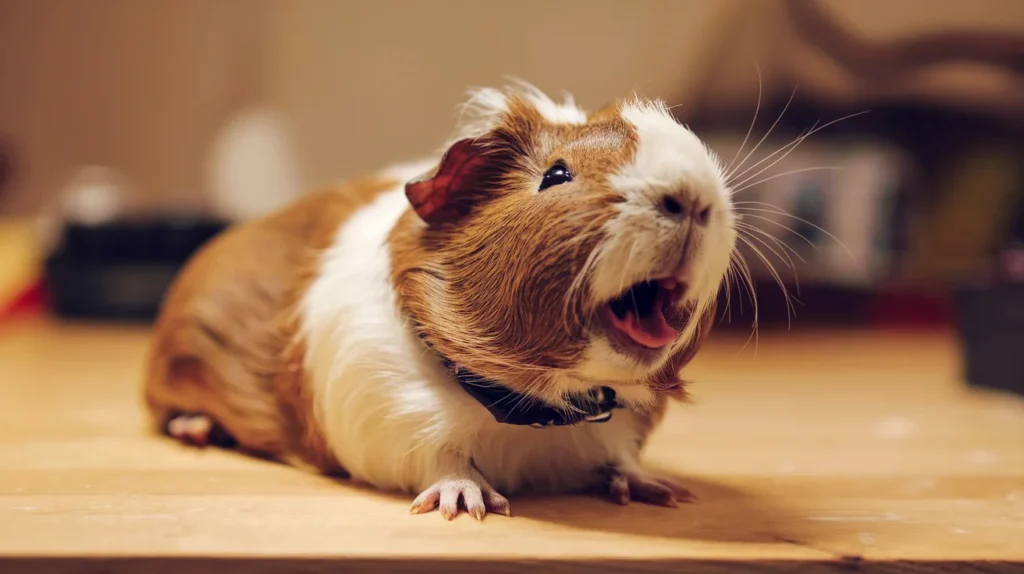Guinea pigs are delicate, lovable pets that bring joy to millions of households. However, their curious nature can lead them into trouble, especially when they encounter toxic substances. Recognizing guinea pig poisoning symptoms early and acting quickly can save your pet’s life. In this detailed guide, we’ll explore the causes, symptoms, and treatments for both organic and chemical poisoning. Additionally, we’ll provide practical tips to prevent accidental poisoning and answer common questions about guinea pig safety.
Organic Poisoning in Guinea Pigs 🌱⚠️
Common Sources of Organic Poisoning
Organic poisoning occurs when guinea pigs ingest natural but toxic substances. Despite the term “organic,” these items can be incredibly harmful. Here are some common sources:
- Toxic plants: Many household and garden plants like lilies, foxglove, daffodils, and oleander are poisonous to guinea pigs.
- Spoiled food: Guinea pigs are herbivores, and feeding them moldy hay, rotten vegetables, or fermented fruit can introduce toxins.
- Wild plants: Weeds like buttercup or ivy, which may seem harmless, are dangerous.
Organic Poisoning Symptoms
If your guinea pig has been exposed to organic toxins, watch for these symptoms:
- 🐾 Lethargy: A sudden drop in energy levels is often the first red flag.
- 🍃 Loss of appetite: Refusal to eat or drink is a common reaction to poisoning.
- 💩 Diarrhea: Unusual stool consistency or excessive droppings may indicate an issue.
- ⚡ Neurological issues: Signs like twitching, seizures, or difficulty balancing could point to toxin exposure.
Quote: “Timely identification of symptoms can be the difference between life and death for a poisoned guinea pig.” – Dr. Sarah Parker, Exotic Pet Veterinarian
Immediate Treatment for Organic Poisoning
When organic poisoning is suspected, act fast:
- Remove the toxin: Identify and take away the suspected plant or food source.
- Rinse their mouth: Gently clean their mouth with a damp cloth if the toxin is still present.
- Offer hydration: Dehydration worsens poisoning. Provide fresh, clean water immediately.
- Call the vet: Describe the symptoms and any substances ingested to your veterinarian.
- Avoid home remedies: Activated charcoal or other treatments should only be used under veterinary guidance.
| Symptoms | Treatment Actions | Notes |
|---|---|---|
| Lethargy | Remove access to toxins | Contact vet immediately |
| Neurological signs | Hydrate and stabilize | Vet may use anticonvulsants |
| Diarrhea | Provide clean water | Avoid solid food until cleared |
Chemical Poisoning in Guinea Pigs 🧪❌
Common Sources of Chemical Poisoning
Unlike organic toxins, chemical poisoning arises from man-made substances. Guinea pigs may encounter these in households that are not guinea pig-proofed:
- Cleaning products: Items like bleach, ammonia, or detergents are highly toxic.
- Pesticides: Fertilizers or insecticides sprayed near your guinea pig’s habitat can contaminate food or water.
- Medications: Human drugs, including over-the-counter painkillers, can be fatal if ingested.
Symptoms of Chemical Poisoning
Chemical poisoning often presents differently than organic poisoning. Watch for these signs:
- 🐾 Breathing issues: Rapid, shallow breaths or wheezing.
- 🌡️ Skin irritation: Redness or burns where the chemical came into contact with their skin.
- 🤮 Excessive salivation: Frothing at the mouth or drooling.
- 🤯 Behavioral changes: Fearfulness, confusion, or sudden aggression.
Case Study: A guinea pig named Cocoa accidentally inhaled fumes from a cleaning spray. Cocoa exhibited labored breathing and refused food. After being taken to an emergency vet, Cocoa was stabilized with oxygen therapy and recovered fully.
Treatment for Chemical Poisoning
- Isolate the guinea pig: Move them to a safe, ventilated area away from the toxin.
- Rinse thoroughly: If the chemical is on their skin or fur, gently wash the affected area with lukewarm water.
- Do not induce vomiting: Vomiting may worsen the situation depending on the chemical ingested.
- Call the vet immediately: Provide the name of the chemical if possible for precise treatment.
| Chemical | Symptoms | Veterinary Action |
|---|---|---|
| Cleaning agents | Breathing difficulty | Oxygen therapy and fluids |
| Pesticides | Excessive salivation | Detox and hydration therapy |
| Medications | Skin irritation or burns | Topical treatment and monitoring |
Preventing Accidental Poisoning 🛡️🐾
Prevention is the best cure when it comes to guinea pig poisoning. Here are some actionable tips to protect your furry friends:
- Check plants carefully: Before allowing your guinea pig to roam, ensure that all plants in their environment are non-toxic.
- Store chemicals safely: Keep cleaning supplies, fertilizers, and other dangerous substances out of reach.
- Provide safe bedding: Avoid cedar or pine shavings, which can release harmful fumes.
- Inspect food regularly: Always provide fresh and clean food. Remove uneaten vegetables after a few hours to prevent spoilage.
Conclusion
Guinea pigs rely on their owners for a safe and toxin-free environment. By understanding the symptoms and treatments of both organic and chemical poisoning, you can act swiftly to protect your pet. Remember to maintain a guinea pig-safe household and consult your vet at the first sign of trouble.
Final Tip: Prevention is always better than cure. A well-informed owner is a guinea pig’s best defense!
People Also Ask (FAQs)
What are the first signs of poisoning in guinea pigs?
Lethargy, loss of appetite, and abnormal behavior are early indicators.
Can guinea pigs recover from poisoning?
Yes, but only with immediate treatment and professional care.
What foods are toxic to guinea pigs?
Avoid avocados, onions, garlic, and any processed foods.
Is activated charcoal safe for guinea pigs?
It can be, but only under the guidance of a veterinarian.

